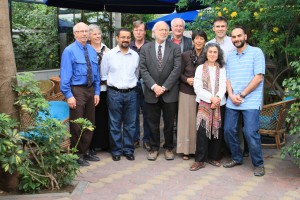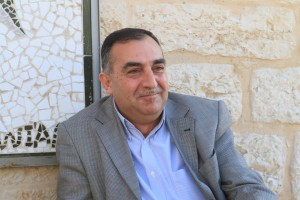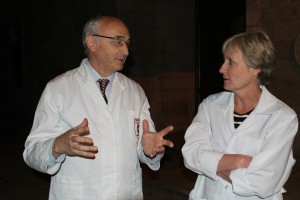Leaving Gaza for the West Bank and Bethlehem, by Gerri Haynes
(Gerri Haynes, a former president of Washington Physicians for Social Responsibility, is once again sending back reports from inside blockaded Gaza. As she did four times before, Gerri has organized a team of doctors and other health care providers to work in hospitals and clinics in Gaza in an effort to directly help the people there and to bring attention to the ongoing humanitarian crisis that the Israeli blockade has created. Eighth in the series.)
As we leave Gaza, we reflect on our brief and full time. Each day was packed with opportunities to work and serve and I am thankful to have traveled with a dedicated and expert group. The passage through Erez is always time consuming. The steps are numerous – from the first taxi ride to the Gaza checkpoints, to the taxi ride between Gaza checkpoints, to the long walk through the open-air tunnel to the Israeli side, the multiple inspections of every item we transport, to the reclaiming and repacking of our suitcases, to passport control and finally, to the van waiting to take us to Bethlehem. Today’s passage was remarkably more rapid than some – from first ride to the van took only four hours – a small portion of the time required for Palestinians who might possibly be able to pass this way for medical care.
We were driven through a winding two-lane road up to the bypass road that leads to Bethlehem. We passed large orchards, vineyards and fields of vegetables – all irrigated from the aquifer common to Israel and Palestine; the aquifer pumped by Israel that thus denies water to Gaza.
In Bethlehem, Zoughbi Zougbhi, director of Wi’am, Palestinian Conflict Resolution Center, welcomed us to his office. There, we enjoyed a spectacular lunch/dinner prepared by his sister-in-law and learned about the community, regional and international conflict resolution work of Wi’am.
We then met with the Water Minister Dr. Simon Al Araj, who re-iterated that of the water available in this area, Israel takes 80%. Additionally, per liter, Palestinians pay substantially more – particularly more than the settlers who live on occupied Palestinian land.This evening, we had a delightful tour of the Holy Family Hospital in Bethlehem. This maternity and infant intensive care hospital serves the entire West Bank. Their Level III nursery takes neonates as young as 28 weeks gestation and has an excellent record of saving lives of very small infants. The hospital has a 20% Caesarean birth rate – lower than the rate in the U.S. – and 100% of the women who give birth here breastfeed their babies.
We were welcomed to the hospital by the CEO, Hussam Wahad. The head physician Dr. Michelle, who, along with his female surgical colleague, led us through the hospital, is from Belgium and serves in this hospital for one week every eight weeks. His gracious demeanor and delightful sense of humor, dedication and respectfulness for the culture were inspiring.
He told stories of his challenges in coming to the region through the airport and checkpoints and his challenges in obtaining essentials such as water. The Head Administrator and Director of Nursing, Sister Maha Sansur, helped us with the tour – showing us again and again that the hospital is a model of technical expertise and care.Tomorrow, we will travel somewhere in the West Bank – learning about the work of people seeking peace in the region.
In reflection on Gaza, Don Mellman wrote: I am a neurosurgeon from Tampa, Florida, who now also does international domestic healthcare policy and management work focused on human rights and am on my third trip to Gaza.
I saw outpatients in the hospital, in outpatient clinics, at their home, and at a makeshift “clinic” at our hotel, The Marna House. I also lectured to surgeons at the large public hospital al Shifa and to fifth and sixth year medical students at the Islamic University of Gaza. I met with the director of the Gaza office of WHO and with leaders of various heath care related NGOs.
RSS feed for comments on this post. TrackBack URI


